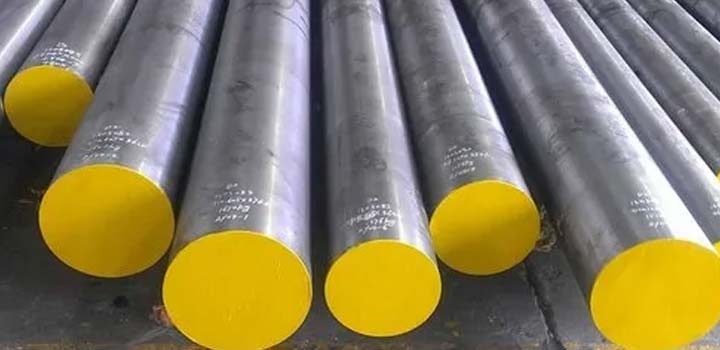The chemical composition of EN8 steel plays a vital role in determining its overall performance. It directly influences key properties such as strength, hardness, toughness, and weldability. Understanding the exact ratio of elements like carbon, silicon, manganese, sulfur, and phosphorus is essential for selecting the right material for specific applications. EN8 is a medium carbon steel that offers a balanced combination of strength and machinability. Its composition includes carbon, silicon, manganese, and small amounts of sulfur and phosphorus, with iron making up the majority. This composition allows it to be used in a wide range of industrial applications where moderate strength and good formability are required. The mechanical properties of EN8 steel define how it performs under different loads and conditions. These include yield strength, tensile strength, impact resistance, and elongation. Engineers use these values to determine the suitability of EN8 for structural or mechanical components that require both durability and flexibility. Material equivalents help in identifying similar grades from different standards, which is especially useful when sourcing materials internationally. EN8 is commonly equivalent to other grades like C45, 1045, and S45C, depending on the country and standard used. The hardness of 080M40 can be adjusted through various heat treatment processes, allowing it to meet different application requirements. This makes it suitable for both general engineering and more demanding industrial uses. While both EN8 and EN9 are medium carbon steels, they differ in their composition and mechanical properties. EN9 has a higher carbon content, leading to greater hardness and tensile strength compared to EN8. EN8 steel is typically forged at temperatures between 1100°C and 850°C, ensuring proper grain refinement and workability during the forging process. Proper heat treatment is essential to achieve the desired mechanical properties. The following are common treatment steps: EN8 steel is available in a wide variety of forms, including plates, sheets, bars, and flat bars, making it suitable for numerous industrial and engineering applications. DIN 1.0511 is a German standard for carbon steel, and it exhibits favorable thermal properties that make it suitable for high-temperature applications. These properties include thermal conductivity and thermal expansion coefficient. Annealing is a heat treatment process that helps reduce hardness and increase ductility. For 080M40 grade steel, the recommended annealing temperature is between 680°C and 710°C. The surface finish and dimensional tolerance of C45 steel are critical for ensuring proper fit and function in various applications. Different finishes like turned, polished, and ground offer varying levels of precision and quality. S45C steel is known for its high surface hardness, which makes it ideal for applications requiring wear resistance and strength. The minimum surface hardness is typically around 55 HRC. To ensure the quality and performance of 1045 steel, several testing methods are employed. These include corrosion testing, chemical analysis, tensile testing, ultrasonic testing, visual inspection, and bend testing. Electrical Cabinet Roll Forming Machine Electrical Cabinet Cold Bending,Cold-Formed C-Beam Material,Sixteen Fold Profile Structure,Cross-Section Of A C-Profile Huai'an Senyu Intelligent Technology Co., LTD , https://www.jshasyzn.com
Table of contents
EN8 Chemical Composition
EN8 Steel Mechanical Properties
Heat Treatment
Yield Strength (MPa)
Tensile Strength (MPa)
Rp 0.2 (MPa)
Impact
Izod (ft.lb)
KCV (J)
MPa
MPa
MPa
N
280
550
–
15
16
245
510
–
–
–
Q
385
625/775
355
25
28
R
465
700/850
450
25
28
EN8 Material Equivalent
Country
British
USA
Australia
Japan
Standard
EN 10083-2
ASTM A29
AS 1442
JIS G4051
Grades
C45 / 1.1191
1045
1045
S45C
080M40 Steel Hardness
Heat Treatment
Hardness (HB)
HB
Normalizing
152–207
146–197
Quenching
179–229
Tempering
201–255
EN8 vs EN9 Steel
Properties
EN8
EN9
Carbon Content
0.36–0.44%
0.50–0.60%
Hardness
Up to 207 HBW
Up to 255 HBW
Tensile Strength
≥540 MPa
≥695 MPa
Forging of EN8 Carbon Steel
Forging or Hot Rolling
1100 – 850°C
Heat Treatment of EN8 Carbon Steel
Soft Annealing
680 – 710°C (furnace)
Normalising
840 – 880°C (air)
Hardening
820 – 860°C (water, oil)
Tempering
550 – 660°C (air)
Available Product Range of EN8 Steel
EN8 Steel Plate and Sheet
Strips
Thickness 0.4mm to 4mm
Sheets (Cold Rolled)
Thickness 0.4mm to 4mm
Sheets (Hot Rolled)
Thickness 2.7mm to 12mm
Plates
16mm to 150mm
Heavy Plates
16mm to 350mm
1045 Steel Round Bar
Rolled Round Bar
Diameter 16mm to 250mm
Heavy Forged Round
Diameter 200mm to 450mm
Heavy Machined Round
Diameter 260mm to 620mm
Heavy Ship Shafts
Diameter 450mm to 1000mm
S45C Flat Bar
Rolled Flat Bar
Thickness up to 50mm
Width up to 455mm
Forged Flat Bar
Thickness up to 305mm
Width up to 455mmThermal Properties of DIN 1.0511
Thermal Conductivity
Thermal Coefficient
37.5 W/m K
6.5e-6 W/m K
Annealing of 080M40 Grade Steel
Annealing
680–710°C
Surface Finish & Tolerance of C45 Grade Steel
Surface Finish
Turned
Black-Rolled
Polished
Grinding
Cold Drawn
Black-Forged
Peeled
Tolerance
(0, +3mm)
(0, +1mm)
Best h11
Best h9
Best H11
(0, +5mm)
Best H11
Surface Hardness of S45C Steel
Surface Hardness
Min. 55 HRC
Testing Methods for 1045 Steel
Carbon
0.36–0.44%
Silicon
0.10–0.40%
Manganese
0.60–1.00%
Sulfur
Max 0.050%
Phosphorus
Max 0.05%
Iron
97.75–98.05%